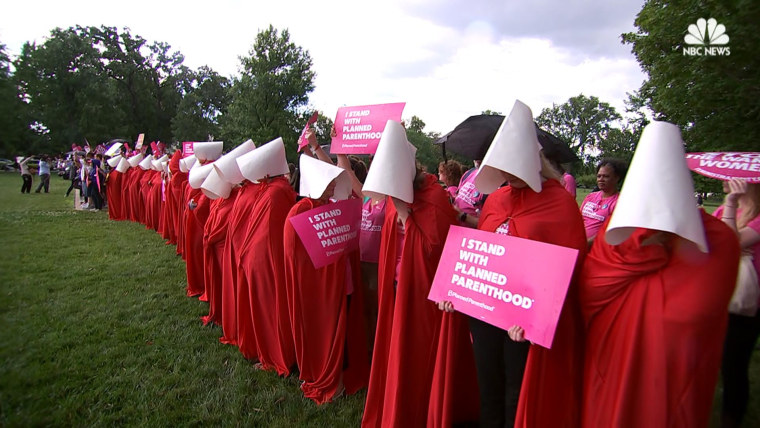After the Supreme Court’s Dobbs decision struck down America’s constitutional right to abortion in June, many commenters argued that the U.S. had embraced the nightmare misogynist dystopia of Margaret Atwood’s novel “The Handmaid’s Tale.” While others cautioned against hyperbole, nightmarish stories of states denying women and pregnant people basic medical care have indeed started to proliferate. This week, Sen. Lindsey Graham, R-S.C., introduced a bill in the Senate that would ban abortion after 15 weeks in most cases, Indiana’s near-total abortion ban officially goes into effect — and the Hulu television series’ newly released season feels more relevant than ever.
The series shows, with passion and insight, how reducing women to their pregnancies is part and parcel of stripping them of rights and power.
Yet, post-Dobbs, the fifth season of “The Handmaid’s Tale” also feels oddly out of touch with our current moment. The series shows, with passion and insight, how reducing women to their pregnancies is part and parcel of stripping them of rights and power. But it also, almost despite itself, defines its female characters through motherhood. Abortion is barely mentioned in the first eight of the 10 episodes available for review.
“The Handmaid’s Tale” is set in a near future in which environmental degradation has caused fertility rates to plummet. The resulting social chaos enabled a rabidly patriarchal theocracy, called Gilead, to overthrow the United States. In Gilead, fertile women of low status are designated as “handmaids” and ritually raped by Gilead’s leaders. After the handmaids give birth, their children are raised by the leaders and their wives.
The first four seasons of the show follow handmaid June Osborne (Elisabeth Moss) as she endures and finally escapes the clutches of Gilead leader Fred Waterford (Joseph Fiennes) and his wife, Serena Joy (Yvonne Strahovski). At the beginning of season five, June and Serena are in Canada. June is a refugee. Serena’s legal status is uncertain, but she retains ties to Gilead and its supporters abroad.
June has become an icon of resistance, a tireless and fierce opponent of Gilead. Much of her rage and determination is tied to her child, Hannah, who was stolen by the regime. Though June escaped, Hannah remains behind, and June is determined to get her out, too.
June in Canada is free — mostly. Serena, in contrast, has become more restricted — not least because she has become pregnant. Serena thought she was infertile, and is thrilled to find she can bear a child. But Gilead, and Gilead’s influence, can be difficult to escape. To its citizens and supporters, to be pregnant is to become a resource of the state. And to her horror, Serena watches her colleagues, her well-wishers, her gynecologist and even her servants use the welfare of her unborn child as an excuse to control her career, her movements, even her diet. She is bullied and condescended to and treated, as she notes, like a handmaid. Her predicament illustrates with chilling clarity how natalist obsessions are leveraged to subjugate women, even socioeconomically privileged women.
The show critiques those natalist assumptions. But it also, to some degree, accepts them.
The show critiques those natalist assumptions. But it also, to some degree, accepts them. The future it imagines is one in which babies are scarce, in Gilead, in Canada, and around the world. People are desperate for children. In this season, June and Serena are both motivated primarily by a passionate commitment to protecting their children. And other major female characters are similarly defined by their relationship to motherhood.
Aunt Lydia (Ann Dowd) is a single woman, but her job in Gilead is to prepare handmaids for pregnancy. Moira (Samira Wiley), June’s friend and a lesbian, has her role much reduced in this season; we mostly see her helping care for June’s younger daughter, Nicole.
Emily Malek (Alexis Bledel) does leave her child to go fight in the resistance at the beginning of season five. But that signals her departure from the show, so we never explore that decision on screen. Janine (Madeline Brewer) is a formerly rebellious handmaid who has acquiesced in her subjugation in large part so that she can have occasional contact with her daughter, who is being raised by one of Gilead’s powerful families.
Janine had an abortion in her life before Gilead. We saw a flashback in season four of her struggling to access reproductive health care in the face of right-wing demonstrations and deceptions.
That experience isn’t mentioned in season five, though. Nor is there much indication that Janine, or really any handmaid, has ambivalent feelings about the children of rape they are forced to carry to term, even though such ambivalence in reality is common.
Janine hates her rapist. But the show mostly explores the trauma she feels because she cannot be a mother to her child. There are a lot of mothers fighting for their children in “The Handmaid’s Tale.” There are not a lot of women fighting against the expectation that they have to be mothers.
This is not exactly surprising. Television has long been leery of representing or validating abortion. That’s changed somewhat in recent years. But the new Netflix film “Look Both Ways,” for example, about how a woman’s life is upended by an unplanned pregnancy, goes out of its way to avoid imagining abortion as a plausible choice.
A woman fighting for her child on television is still seen as a universal story. A woman fighting not to have a child is still more likely to be an exceptional, occasional special episode.
Yet, every day now, we have more and more evidence that forcing women to be mothers leads to sweeping authoritarianism and breathtaking cruelty. “The Handmaid’s Tale” is about this, in theory. In practice, though, showrunners appear helpless before the default television narrative. Perhaps even “The Handmaid’s Tale” wasn’t fully prepared for Gilead to come so quickly.
Source: | This article originally belongs to Nbcnews.com










